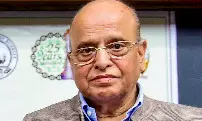Kasturirangan shaped India's space ambitions, educational framework: ISRO chief

Bengaluru: ISRO Chairman V Narayanan has remembered Dr Kasturirangan as a transformative figure of the nation, who profoundly shaped India's space ambitions, educational framework, and showed the vision for the future.
In his condolence message, he said, Kasturirangan's life, marked by an unwavering pursuit of knowledge and its application for the nation's advancement, has left an enduring legacy. Former ISRO chief K Kasturirangan, who was at the helm of the space agency for nearly a decade, passed away in Bengaluru on Friday at the age of 84.
His mortal remains were kept at the Raman Research Institute (RRI) on Sunday for the public to pay their last respects, ahead of the last rites with full state honours.
"In the Indian tradition, it is believed that the seeds sown by great individuals blossom into mighty trees, offering shade and sustenance for generations to come, thereby forming a rich ecosystem and legacies down the line. Professor Kasturirangan's visionary work in space and education has indeed grown into such lofty trees, inspiring countless individuals to pursue careers in science and contribute to the nation's progress," Narayanan said.
His indomitable spirit, characterised by unwavering determination and a relentless pursuit of excellence, will continue to energise future scientific endeavours in the country, he said.
"Let us honour this great inspiration through our own sincere, relentless, and selfless hard work towards building a stronger and more prosperous India," he added.
Recalling that during Kasturirangan's tenure at ISRO Satellite Centre (now the U R Rao Satellite Centre), he was the Project Director for India's first two experimental earth observation satellites, BHASKARA-I & II, the Chairman said, one of his landmark contributions was the expansion of India’s remote sensing (Indian Remote Sensing) programme.
Satellites like IRS-1C and IRS-1D launched during his tenure, provided high-resolution data for use in agriculture, forestry, water resources, and urban planning, he said. His vision helped bridge the gap between advanced technology and development, demonstrating how space science could directly benefit the general public.
Narayanan said that Kasturirangan was ISRO Chairman and Secretary of the Department of Space from 1994 to 2003, and this era witnessed significant progress and several major missions under his insightful guidance.
He spearheaded the successful development and launch of vital satellite series like Indian National Satellite (INSAT) for communication and meteorology, and IRS for Earth observation, he said. The space programme witnessed a successful operationalisation of PSLV and flight testing of GSLV during his leadership, he added.
Notably, India's first lunar mission, Chandrayaan-1, was conceived during his leadership, firmly establishing the nation in lunar exploration and yielding invaluable scientific insights.
As an Astrophysicist, Dr. Kasturirangan's interest includes research in high-energy X-ray and gamma-ray astronomy as well as optical astronomy. He actively supported and drove the development and realisation of the multi-wavelength astronomy mission, AstroSat, right from the beginning, he highlighted.
Pointing out that Kasturirangan also chaired the committee responsible for drafting the National Education Policy (NEP) 2020, a pivotal policy aimed at revolutionising India's education system, the condolence message also stated that that he made a significant contribution to environmental conservation through his role as the Chairman of the high level working group on Western ghats, popularly known as Kasturirangan committee.
Kasturirangan's influence extended far beyond space and education. He held significant positions such as Member of the Planning Commission, Member of the Rajya Sabha from 2003-2009 and Chairman of the Karnataka Knowledge Commission.
His dedication and accomplishments earned him numerous prestigious awards, including the Padma Shri, Padma Bhushan, and Padma Vibhushan, as well as international recognition for his scientific and technological contributions, Narayanan said, adding that these accolades underscore the profound impact he had on India and the world.



